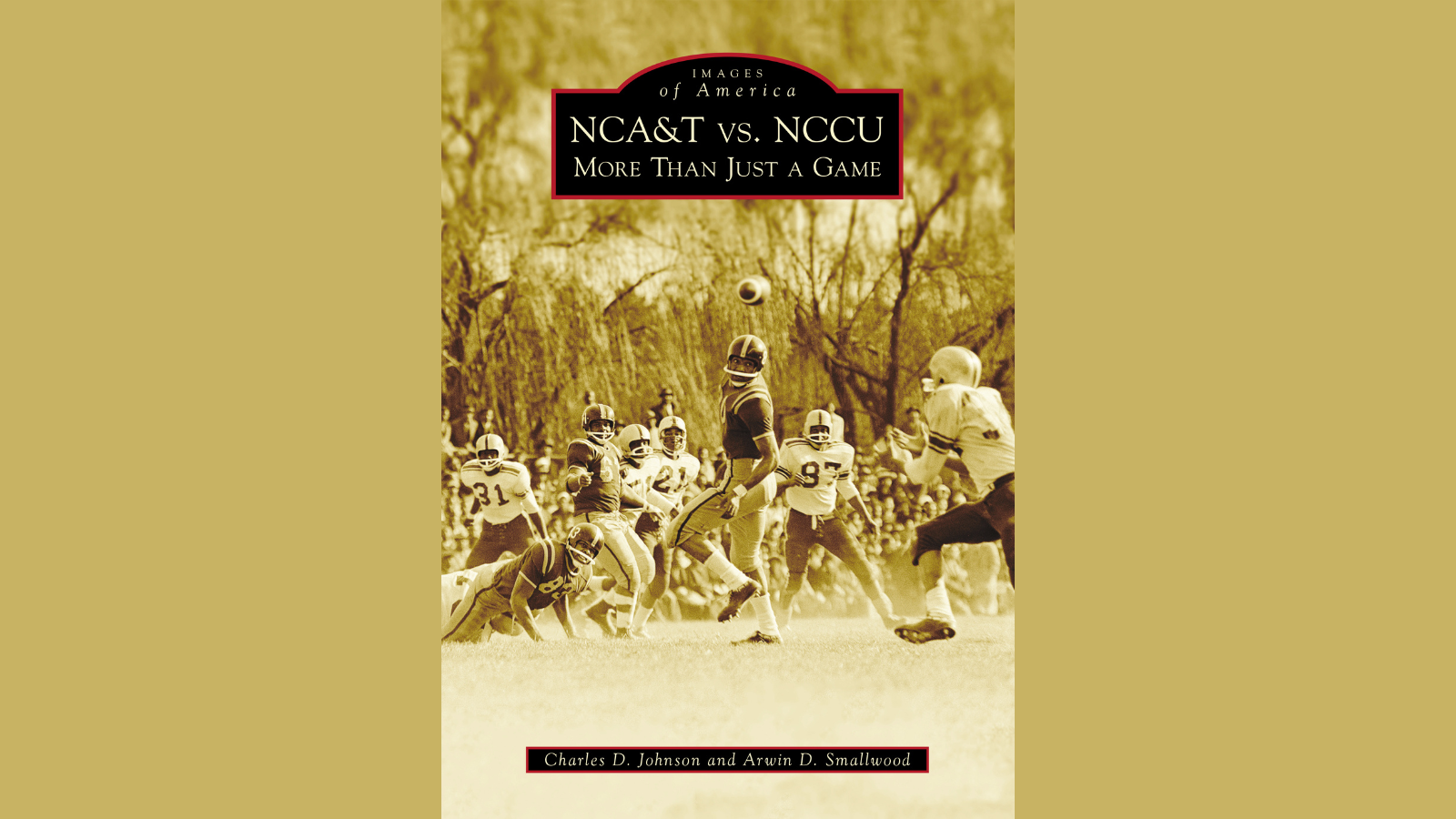“NCA&T vs. NCCU: More Than Just a Game” describes every football game played by North Carolina Central University (NCCU) and North Carolina Agricultural and Technical University (N.C. A&T) from 1922 to 2022. But the book lives up to its title by offering a whole lot more.
The book is co-written by Charles D. Johnson, Ph.D., chair of the NCCU Department of History and Arwin D. Smallwood, Ph.D., chair of the N.C. A&T Department of History and Political Science.
“More Than Just a Game” offers commentary on the different eras of the rivalry, history of the schools and places the rivalry in the context of nationwide historically Black colleges and universities (HBCU) sports. It discusses the coaches, players, alumni and fans of both schools.
There is an abundance of photos of players, coaches and scrimmages along with images of newspaper articles and game flyers. But readers can also view 1950s pictures of cheerleaders with bouffant hairstyles, pre-1970s male fans showing off their suits, overcoats, hats and a 1931 photo of author Zora Neale Hurston at a football game (Hurston taught at the NCCU Drama Department in the late 1930s).
The game descriptions are sometimes amusing. In 1932, when the teams played for the first time on Thanksgiving Day, officials lost track of the number of downs. Eagles player Bill Malone took advantage of an improbable fifth down and scored a touchdown.
“More Than Just a Game” also follows some players beyond college football.
For example, Harry Lash, an Aggies player, was later a track coach in Georgia of Alice Marie Coachman. Coachman was the first African American woman to win an Olympic gold medal (in 1948 for the high jump).
Others, such as N.C. A&T player Robert Herman ‘Stonewall’ Jackson had their cleats in both schools. Jackson was one of the first players from an HBCU to be drafted into the NFL, in his case the New York Giants. After serving in the U.S. Army during World War II, he earned a master’s degree in physical education, coached at a couple of universities, and joined the NCCU football staff in 1969, where he remained until 1999.
The Book Begins
In 2018, Smallwood suggested that he and Johnson collaborate on a book about the football rivalry. A student who conducted initial research found football photos in an archive at the University of North Carolina atChapel Hill dating back to 1958, Johnson said. Having determined the project showed promise, Johnson and Smallwood started research.
“We went through thousands of newspaper articles,” Johnson said. “The Black press including the Norfolk Journal and Guide, The Afro-American from DC and Baltimore and The Carolina Times in Durham.”
Among the challenges of “More Than Just a Game” were deciding what content to include in the 192-page book. With football teams of 50 to 60 players each year, plus coaches and staff, it was impossible to include everyone.
Also finding photos from the 1920s and 1930s was more difficult than finding photos from later years.
Smallwood and Johnson also interviewed coaches, players and alumni. “Those players from the 1960s to the present day, they still talk daily,” Johnson said. “There is that closeness between them.”
Early Rivalry
In 1922, the two largest HBCUs in the state, N.C. A&T and NCCU (then named National Training School) played at Dudley Field in Greensboro. N.C. A&T won. In 1923, N.C. A&T did not play NCCU (renamed North Carolina College for Negroes) but earned the North Carolina Athletic Conference state title.
In 1924, NCCU tied N.C. A&T 13–13, though the Eagles had a good year, going 4 wins, 2 ties and 1 loss. N.C. A&T won against NCCU through the remainder of the 1920s.
In 1930, however, personnel changed. N.C. A&T hired Harry “Big Jeff” Jefferson as head football coach. Jefferson had twice won the HBCU national championship for Bluefield State University (then named Bluefield Colored Institute).
Meanwhile, NCCU hired Leo Townsend away from nearby Hillside High School in Durham as head coach. In the 1930 game, the Eagles defeated N.C. A&T for the first time, 20–14.
Nor was the NCCU victory a one-off event. In 1931, 1932 and 1933, the Eagles won.
“For A&T, it really became a rivalry,” Johnson said.
Smallwood agrees that the rivalry began early.
“By the time we got to the 1930s and they started to play regularly, in the Black press they are calling the game a ‘classic.’ As early as the 1930s, you see newspaper articles describing them as ‘ancient rivals.”
Friendly Rivals
“What makes the rivalry so intense is that the people are so close,” Johnson said. “Fifty miles apart. In any given household, you have both Aggies and Eagles. The parents might split and the children too.”
Rivalry or not, fans of both teams intermix in the stands, Johnson said.
“Even at the game last year, we were surrounded by people from AT&T. We all sat and talked. Eagles are Eagles and Aggies are Aggies, but we are very close, like an extended family.”
Football was not the only rivalry, said Smallwood. “They were competing for the same students, the same athletes, the same resources from the state legislature. Both had strong leaders, Dr. James E. Shepard and Dr. James B. Dudley.”
Both Smallwood and Johnson became interested in the rivalry at a younger age.
Smallwood enjoyed going to games as an NCCU student, particularly the NCCU vs NC A&T game.
“The other games in the conference were entertainment,” Smallwood said. “There was a different kind of atmosphere around that game.”
Johnson grew up in Durham within walking distance of NCCU and began attending NCCU football games as a young boy. He was not unusual.
“Everyone came to the games at NCCU,” Johnson recalled. “Even people who were not alumni. People from Durham, African Americans in particular, pulled for NCCU. It was the hometown team.”
100 Years of NCCU vs N.C. A&T Football Rivalry Chronicled in New Book
